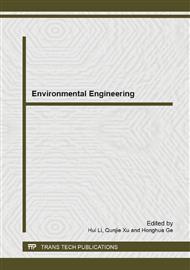p.1947
p.1954
p.1959
p.1963
p.1968
p.1976
p.1981
p.1985
p.1989
A Strategy for Sustainable Mananagement of Municipal Solid Waste in Kano Metropolis, Nigeria
Abstract:
This paper assesses the current management of municipal solid waste in Kano metropolis, Nigeria. Data was collected through a desk study of the operations of the state agency responsible for waste management, - Refuse management and sanitation board (REMASAB); interview with key officials of the agency; participation in the day to day activities of the agency; direct measurement and segregation of the waste; laboratory analysis of some bacterial isolate in the waste and interview with residents of the city between 2006 - 2013. The results of the study indicates that 79.25% of the residents do not use official dump site , 68% consider the service as very poor, 55% believe frequency of collection is unsatisfactory and 92.4% believe coverage is very poor. Presence of some bacterial isolate in the waste such as escherichia coli 86.7%, staphylococus aureus 76.7%, shigella 43.3% samonella Sp 46.7%, klebsiela Sp 43.3%, protues Sp 33.3%, indicates presence of faecal matter and may be the source of the high prevalence of cholera, diarrhea and typhoid in Kano metropolis. The high organic content 61%, ash and dirt 20 %, use of unsanitary landfill portends great potential for methane generation which is dangerous to the global environment. The paper recommends a decentralised system to local authorities where local businesses can be created to utilise the large pool of unemployed as well as to explore the opportunities of the waste management chain in recycling, composting, re-use and equipments manufacture. The paper highlighted some of the constraints that must be addressed to ensure the success of the proposal, which includes, lack of data collection on waste stream, lack training and need to create awareness among the public. Key Words: Sustainable development, municipal waste management; recycling; composting; reuse
Info:
Periodical:
Pages:
1968-1975
Citation:
Online since:
December 2013
Authors:
Price:
Сopyright:
© 2014 Trans Tech Publications Ltd. All Rights Reserved
Share:
Citation:


